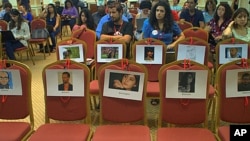Pro-democracy activists attending this week’s 3rd annual Arab Bloggers Conference in Tunis thought they were gathering for four days of networking, socializing and information sharing; instead, they found themselves organizing yet another protest.
The list of attendees reads like a Who’s Who of the Arab Spring, but most notable were the participants who were prevented from showing up - Palestinian bloggers. Organizers invited twelve bloggers to Tunis, but only one Palestinian blogger, Saed Karzoun, was granted a visa. It’s believed that this is because he submitted a visa request much earlier than the others. Entry was denied to the other eleven.
Lama Hourani is a program coordinator in the West Bank office of the Heinrich Boell Foundation, which co-sponsored the meeting along with Global Voices Online and Tunisia’s Nawaat Association. She says she followed the same procedures in applying for visas for the Palestinians as she did all for all the other conference attendees.
“We were told that it would only take a few days, don’t worry,” said Hourani. “And then suddenly, we were told after a few days, that the Ministry of the [Tunisian] Interior refused the visas.”
Hourani says the Embassy offered no reason, but suggested she appeal to the Interior Ministry to reconsider their decision. She says the Embassy claimed they had denied the visas because Nawaat is not a registered organization in Tunisia and therefore, the conference itself was not licensed.
Why then, wonders Hourani, were all the other Arab attendees granted entry?
Blogger Saleh Dawabsheh was also denied the chance to attend the conference. He described his reaction to VOA: “I did nothing at the very beginning, but then when I saw other bloggers from all over the world participating in the conference, I got mad and I decided to do something.” He and the other bloggers drafted a statement of their own:
"We, the undersigned…demand that the Tunisian authorities issue a formal apology addressed to both the Palestinian and Tunisian peoples for undermining their historical ties, as well as for preventing Palestinian bloggers from benefiting from their Arab colleagues’ acquired expertise in their joint battle for liberty, dignity and humanity."
Meanwhile, the event sponsors issued a formal statement protesting Tunisia’s decision:
"We demand an explanation from the Tunisian Interior Ministry and seek clarification as to why Palestinian participants were denied… an Arab Bloggers Meeting without participation from Palestinians is an offense to the long tradition of solidarity between Tunisia and Palestine, and deprives participants of a key contingent of the Arab blogging community."
Asked to offer an opinion on why he was blocked, Dawabsheh said, “I can’t think of any reason because this never happened before.” He says, however, he’s certain that this was no accidental omission, but something planned. “And that's why we're working very hard to get this explanation, and at least to not be discriminated this way again.”
The apparent snub is all the more unusual because historically Tunisia has been a strong backer of Palestinian initiatives. From 1982 to 1991, Tunisia was home to Yasir Arafat and the Palestinian Liberation Organization (PLO) after the resistance movement was driven out of Beirut during the Israel Lebanon War. More recently, Tunisia also supported the Palestinian Authority’s bid for U.N. statehood.
It should be noted that VOA placed several calls to the Embassy of Tunisia in Washington for clarification, but received no answer.
Getting Around Governments
In spite of the distraction, the four-day conference went on as planned. In formal sessions and informal discussion groups, bloggers emphasized the important role of citizen journalists in global events. As blogger Jillian York, Director of International Freedom of Expression at the Electronic Frontier Foundation in San Francisco, wrote in her blog, “Tunisians were aware of corruption and human rights violations, but leaks and activism confirmed it.”
Bloggers also shared methodologies to insure that the internet remains a tool of citizens, rather than governments, debating the merits of a variety internet privacy tools and security software; they argued big issues, such as pan Arabism and restricted regional borders; and they paid tribute to protesters in Bahrain and, in particular, Syria, debating the ways in which the Arab blogosphere could best assist Syrians still suffering under harsh government repression.
In their final tweets, participants talked about the sense of unity and solidarity, and planned future events and protests. Dawabsheh, who was able to follow events back home via the internet, said he was disappointed he could not be there in person, but at least one good thing had come out of the ordeal:
“The Tunisian Ministry of Interior gave the Arab bloggers a great topic and a great issue to talk about, defend, and support, this issue united the Arab bloggers and made them feel that they're one hand," said Dawabsheh.
In the end, perhaps one tweet by @astaris summed the meeting better than any other: “What MENA autocrats fear most of all isn’t tech, but the kind of human network that came together in Tunis.”




